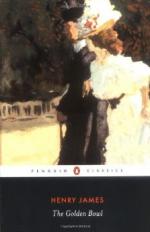She had been afraid of the particular passage with Charlotte that would determine her father’s wife to take him into her confidence as she couldn’t possibly as yet have done, to prepare for him a statement of her wrong, to lay before him the infamy of what she was apparently suspected of. This, should she have made up her mind to do it, would rest on a calculation the thought of which evoked, strangely, other possibilities and visions. It would show her as sufficiently believing in her grasp of her husband to be able to assure herself that, with his daughter thrown on the defensive, with Maggie’s cause and Maggie’s word, in fine, against her own, it wasn’t Maggie’s that would most certainly carry the day. Such a glimpse of her conceivable idea, which would be founded on reasons all her own, reasons of experience and assurance, impenetrable to others, but intimately familiar to herself—such a glimpse opened out wide as soon as it had come into view; for if so much as this was still firm ground between the elder pair, if the beauty of appearances had been so consistently preserved, it was only the golden bowl as Maggie herself knew it that had been broken. The breakage stood not for any wrought discomposure among the triumphant three—it stood merely for the dire deformity of her attitude toward them. She was unable at the minute, of course, fully to measure the difference thus involved for her, and it remained inevitably an agitating image, the way it might be held over her that if she didn’t, of her own prudence, satisfy Charlotte as to the reference, in her mocking spirit, of so much of the unuttered and unutterable, of the constantly and unmistakably implied, her father would be invited without further ceremony to recommend her to do so. But any confidence, any latent operating insolence, that Mrs. Verver should, thanks to her large native resources,




